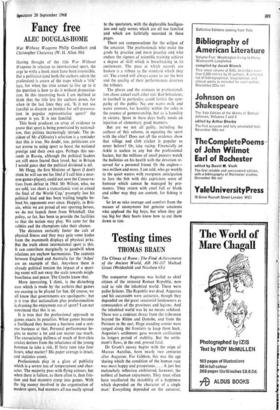Fancy free
ALEC DOUGLAS-HOME
Having thought of the title War Without Weapons in relation to international sport, the urge to write a book must have been irresistible.
But a politician (and both the authors adorn the profession) is aware of the traps which a `title' lays, for when the time comes to live up to it the question is how to do it without dramatisa- tion. In this interesting book I am inclined to think that the title lets the authors down, for when in the last lines they ask, `Is it not too fanciful to discern an instinct for self-preserva- tion in popular representative sport?' the answer is yes. It is too fanciful.
This book produces an array of evidence to prove that sport is being penetrated by national-
ism, that politics increasingly intrude. The in-
cident of Mr d'Oliveira's selection is a reminder that this is true. No doubt, too, politicians are not averse to using sport to boost the national prestige and their own. egos. Perhaps this suc- ceeds in Russia, although the political leaders are still more feared than loved, but in Britain I would guess that the political dividend is nil.
Mr Hogg, the first Minister of Sport (I don't think he will sue me for libel if I call him a near- non-games-player), could not save the Conserva- tives from defeat in 1964. Mr Wilson, who, we are told, `cut short a transatlantic visit to attend the final of the World Cup,' promptly lost his
political lead and has been trailing lengths be- hind his opponents ever since. Happily, in Brit-
ain, while we are proud of our sporting heroes, we do not launch them from Whitehall. Our policy, so far, has been to provide the facilities so that the nation may play. We cater for the rabbits and the champions take their chance.
the dictators certainly foster the 'cult of physical fitness and they may gain some kudos from the mammoth displays of physical jerks.
But the truth about international sport is this. It can contribute marginally to goodwill when relations are anyhow harmonious. The contests between England and Australia for the `Ashes' are an example of that. Anywhere there is already political tension the impact of a sport- ing event will not sway the scale towards neigh- bourliness and peace. The Czechs know that.
More interesting, I think, is the disturbing case which is made by the authors, that' games
are ceasing to be played for fun. Of course, we all know that governments are spoilsports : but is it true that nationalism plus professionalism is draining the enjoyment out of sport? I am not convinced that this is so.
It is true that the professional approach to games exacts its penalties. When games become a livelihood they become a business and a seri-
ous business at that. Personal performance be- gins to matter a lot and can matter too much.
The excruciating dullness of much of first-class cricket derives from the reluctance of the young batsman to take a risk. If forty runs take four hours, what matter? His paper average is intact, and statistics count.
Professionals play in a glare of publicity which is a severe test of temperament and char- acter. The majority pass with flying colours, but
when there is failure, as there often is, then frit- tion and bad manners creep into games. With
the big money involved in the organisation of modern sport, bad manners all too easily spread to the spectators, with the deplorable hooligan- ism and ugly scenes which are all too familiar and which are faithfully recorded in these pages.
There are compensations for the eclipse of the amateur. The professionals who make the grade by practice and more practice and who endure the rigours of scientific training achieve a degree of skill which is breathtaking in its excitement. The pace at which records are broken is a tribute to the standard which they set. The crowd will always come to see the best and the quality of their performances deserves the tributes.
The pluses and the minuses in professional- ism about cancel each other out. Bad behaviour, in football in particular, could forfeit the sym- pathy of the public. No one wants milk and water contests, for hostility within the rules is the essence of gamesmanship, but so is humility in victory. Sport in these days badly needs an injection of elementary good manners.
But are we not all guilty, including the authors of this volume, in equating the sport with the elite? Does not all the evidence show that village and club cricket is popular as never before? Or, take racing. Financially an Arkle is useless to any but the professional backer, but the millions of small punters watch the bulletins.on his health with the devotion re- served for a personal friend. Or the anglers— two million and more, I am told, who go weekly to the quiet waters with evergreen anticipation to lure the fish with this capricious sense of humour which cannot be managed by pro- moters. They return with creel full or blank and either way they are content, for fishing is fun.
So let us take courage and comfort from the masses 'of anonymous but genuine amateurs who applaud the big boys, but when they get too big for their boots know how to cut them down to size.










































 Previous page
Previous page